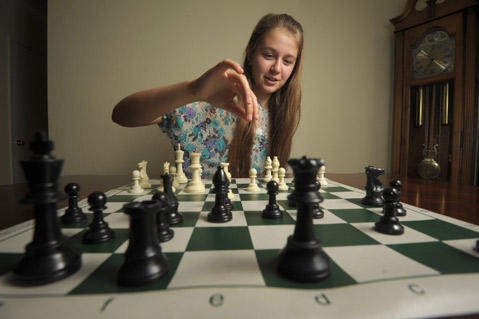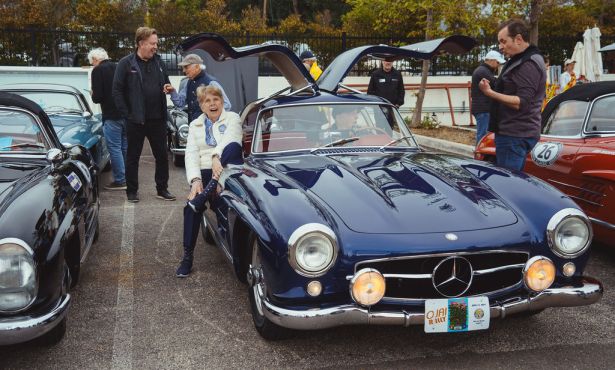Goleta’s Teenage Chess Wizard
Agata Bykovtsev, 13, to Represent United States in World Championships Next Month

With the sun starting to set over Ventura on a Tuesday evening in June, about 20 people sat down across from each other inside a sparsely decorated classroom on the Church of the Foothills campus. They were mostly older white men, many looking like Revenge of the Nerds cast members all grown up, but others appeared athletic, like they’d just finished a marathon. Add to that mix a slightly disheveled woman in her sixties, a couple of fresh-faced Asian kids no taller than golf clubs, and one bespectacled girl of 13 years, whose red socks sported pink, white, and black polka dots.
Between each of the pairs was a black-and-white checkered board; across from the polka-dotted sock player sat a middle-aged man in khaki pants, her challenger in this week’s Ventura County Chess Club match, which is the only regularly scheduled U.S. Chess Federation event near Santa Barbara. The march toward checkmate had just begun — the buzz of the Alcoholics Anonymous meeting next door was the only thing cutting the silence — but the man’s chin was already in his hands, his legs bouncing with anxiety. Like most anyone of a certain age, he didn’t want to lose to a teenage girl, even if Goleta’s Agata Bykovtsev happens to be recognized as one of the top female chess players on the planet. The club’s president quickly confirmed my suspicions, whispering into my ear, “Most of the guys here are scared of her.”
They should be. As usual, Bykovtsev would win that night, but she also broke the 2,000 rating for the first time in her four-year career, which started when she was a 9-year-old student at the now-closed St. John of Damascus Academy in Goleta. Though her score, which is a formula based on games played and won, has dipped a tad since that night to 1,989, Bykovtsev’s rankings remain astounding: Out of nearly 50,000 players nationwide, the 13-year-old is ranked 2,521; out of 35,266 juniors, she is 512; and out of 5,811 female chess players in the United States, she is number 91. And for girls her age, Bykovtsev regularly ranks between second and fourth in the nation.
This November, she will once again be traveling to represent her country at the World Youth Chess Championships. This year, the two-week, six-hour-match-per-day showdown goes down in Slovenia, but last year, it was in Brazil, where Bykovtsev tied for sixth but then finished eighth after playoffs, narrowly missing a medal, despite being up against young kids who essentially play chess professionally, frequently traveling the world on the dime of sponsors.
In America, though, youth chess remains nothing more than a dedicated hobby, which is a continual source of healthy, humorous tension in the Goleta home that Bykovtsev shares with her older brother and mom, Rita Makogon, who started working at UCSB 12 years ago when she left Uzbekistan, where Bykovtsev was born. “Kids these days — they normally don’t have the patience — things are moving so fast,” Makogon told me in Ventura that night, our hushed conversation occasionally shushed by the concentrating players. “At the highest level, you can make a living, but you can’t get rich.” She worries that her daughter is wasting her childhood on a game that will never pay off but also believes it helps with critical thinking and admits that it’s led to lots of traveling, although those expenses cause more angst.
“I don’t understand — all I can do is support,” said Makogon in her Russian-accented English when asked why her daughter does it. “If tomorrow, she says she doesn’t want to do it, that’s fine. It is what it is. She loves it.”
The Beauty of Brains
When we met in their Winchester Canyon home a few weeks later, Agata Bykovtsev looked like a different person. While her spectacles, pulled-back hair, and introverted demeanor made her fit in with the quirky chess crowd down in Ventura — we never even talked at that event, so focused was she on the task at hand — she looked much more like a beach-going teenager at home: dirty blonde, sun-kissed hair, stylish blouse, no glasses, lots of spunk and smiles. It turned out she’d just gotten contact lenses a few days before, but she’ll keep wearing glasses to play chess, and she won’t stop pursuing her pastime any day soon.
Planning to play at least through high school, Bykovtsev’s goal is to make it to the U.S. Championships, which means she would be one of the top 10 female players in the country, no matter the age. She figures she can do so in three to five years and believes that will help with college applications. That’s yet another notion her mom laughs at, and their back-and-forth banter is nearly theatrical, with Bykovtsev at one point asserting that her mom “doesn’t even know how to set up the pieces.” But her mom’s concerns are reflected in Bykovtsev’s realism, as the daughter explained, “I don’t think I’m going to make a career in chess,” instead hoping to one day be an engineer.
So why, then, spend so much time studying the game, which includes daily puzzles via The Manual of Chess Combinations, the Ventura matches, the frequent tournaments all over the country, and the weekly two-hour coaching sessions with an expert in North Hollywood, where she learns about endgames, positional play, and attacking moves? “You get to try to solve problems,” explained Bykovtsev, who is currently home-schooled but plans to attend Goleta Valley Junior High next year. “It’s complicated. You think. It’s something to do with your brain.”
It clearly hasn’t hampered her education: In addition to her classes at home, Bykovtsev takes pre-calculus at SBCC, plays the violin, and last week was one of 52 students out of more than 1,000 applicants to be named a Jack Kent Cooke Young Scholar, which is known as the Nobel Prize for 7th graders and includes a Washington, D.C., trip next summer. Plus, chess is enjoyable, as Bykovtsev explained without irony, “My attacking manual is pretty fun.”
Though none of Bykovtsev’s friends play chess — indeed, she said, “Nobody here plays chess” — they are actually intrigued by her hobby. “They think it’s cool,” reported Bykovtsev, who is also quick to dispel the stereotype that chess players are antisocial. “We’re all fine,” she said, and that’s one thing her mom quickly agrees with, having been on so many chess trips over the past few years. Said Makogon, “These kids are too much social.”
The other insight that Makogon has into the world of youth chess is that Americans are at a deep disadvantage, because kids from many of the other countries are sponsored by the government or business such as banks. “We’re really comparing apples with horses,” she explained. “Somehow, our American kids still win. It’s just pure enthusiasm.”
Bykovtsev will take that enthusiasm with her to Slovenia in a few weeks, although the family is still seeking some financial support to make the trip affordable. In the meantime, Bykovtsev is focusing on her game. “I’m definitely not a positional player, though I’m working on it,” she said. “I’m more of an attacking player. I just want to check, check, and mate.” Luckily for Goleta’s chess wizard, that strategy seems to be working just fine.



